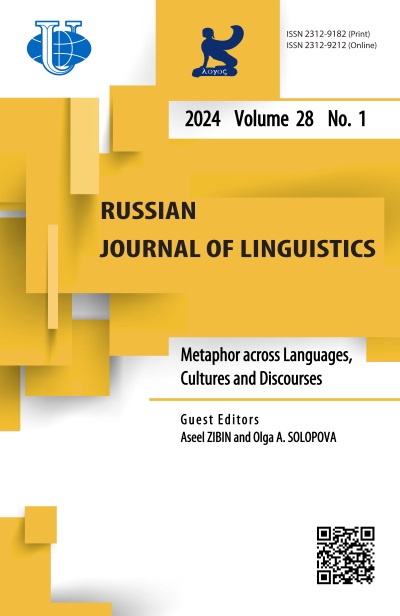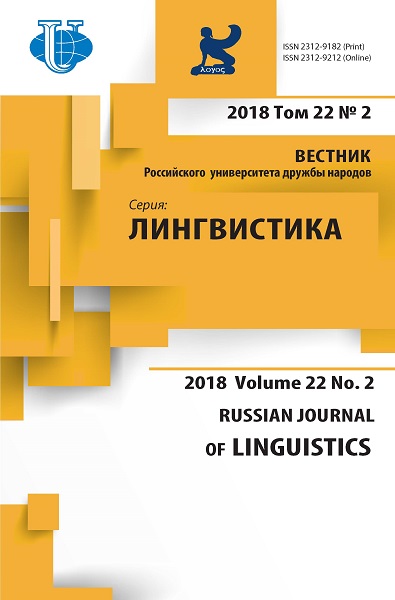DIACHRONIC ANALYSIS OF POLITICAL METAPHORS IN THE BRITISH CORPUS: FROM VICTORY BELLS TO RUSSIA’S V-DAY
- Authors: SOLOPOVA O.A1, CHUDINOV A.P2
-
Affiliations:
- South Ural State University (National Research University)
- Ural State Pedagogical University
- Issue: Vol 22, No 2 (2018)
- Pages: 313-337
- Section: POLITICAL AND MEDIA DISCOURSE
- URL: https://journals.rudn.ru/linguistics/article/view/18590
- DOI: https://doi.org/10.22363/2312-9182-2018-22-2-313-337
Cite item
Full Text
Abstract
The framework for the present research is diachronic political metaphor studies that deal with the historical development and historiographical potential of political metaphors. The relevance of diachronic analysis of political metaphors in British political discourse (1945-2000) is determined by both linguistic and extralinguistic factors. The paper analyzes the evolution of conceptual images associated with World War II. The study utilizes the principle of uniform fragmentation with a 5-year fragmentation step (9 May 1945; 9 May 1950; 9 May 1955 ... 9 May, 2000) interconnected with the principle of focus fragmentation. A digitized sample from the British Newspaper Archive corpus is investigated through corpus analysis, cognitive and discourse analysis and metaphorical modeling. The statistical outcomes demonstrate that the frequency of references to “Russia’s V-Day” in the issues dated by 9 May in each fragmentation step correlates with the general decrease of interest in Russia. The conceptual analysis shows that the military-political discourse is mythologized and tends to present the image of the world as a black-and-white value model. The paper evaluates the pragmatic potential of the dominant metaphorical models, elicits the discursive factors that shape the usage and meanings of metaphors, demonstrates the interdependence between metaphors and the images they generate and emphasizes the role of the historical context in this process. The results of the work are of interest to a wide range of Russian and foreign specialists in cognitive linguistics, political linguistics, political science, history, sociology.
About the authors
OLGA A SOLOPOVA
South Ural State University (National Research University)
Author for correspondence.
Email: o-solopova@bk.ru
Doctor of Philology, Professor at the Institute of Linguistics and International Communications of the South Ural State University (National Research University). Her research interests include linguistic political prognostics, discourse analysis, diachronic political metaphor studies
76 Lenina St., Chelyabinsk, 454080, Russian FederationANATOLY P CHUDINOV
Ural State Pedagogical University
Email: ap_chudinov@mail.ru
Doctor of Philology, Professor, Chair of the Department of Intercultural Communication, Rhetoric and Russian as a Foreign Language at the Ural State Pedagogical University. His research interests focuses on political linguistics and metaphor studies. He is editor-in-Chief of the journal Political Linguistics
26 Kosmonavtov St., Ekaterinburg, 620017, Russian FederationReferences
- Баранов А.Н. Политическая метафорика публицистического текста: возможности лингвистического мониторинга // Язык СМИ как объект междисциплинарного исследования. М.: Изд-во Моск. ун-та, 2003. С. 134—140. [Baranov, A.N. (2003). Politicheskaya metaforika publitsisticheskogo teksta: vozmozhnosti lingvisticheskogo monitoring. In Yazyk SMI kak ob"ekt mezhdistsiplinarnogo issledovaniya. Miscow: Izd-vo Mosk. un-ta, 134—140. (In Russ.)]
- Борискина О.О. Корпусное исследование языка: мода или необходимость // Вестн. Воронеж. гос. ун-та. Серия: Лингвистика и межкультурная коммуникация. 2015. № 3. С. 24—27. [Boriskina, O.O. (2015). Korpusnoe issledovanie yazyka: moda ili neobkhodimost'. Vestn. Voronezh. gos. un-ta. Seriya: Lingvistika i mezhkul'turnaya kommunikatsiya, 3, 24—27. (In Russ.)]
- Будаев Э.В. Политическая метафорология: ракурсы сопоставительного анализа // Политическая лингвистика. 2010. № 1 (31). С. 9—23. [Budaev, E.V. (2010). Politicheskaya metaforologiya: rakursy sopostavitel'nogo analiza. Political Linguistics Journal, 1 (31), 9—23. (In Russ.)]
- Будаев Э.В. Сопоставительная политическая метафорология. Нижний Тагил: НТГСПА, 2011. 330 с. [Budaev, E.V. (2011). Sopostavitel'naya politicheskaya metaforologiya. (Comparative political metaphorology). Nizhnii Tagil: NTGSPA. (In Russ.)]
- Иссерс О.С. Коммуникативные стратегии и тактики русской речи. Изд-е 5. М.: Изд-во ЛКИ, 2008. 288 с. [Issers, O.S. (2008). Kommunikativnye strategii i taktiki russkoi rechi. (Communicative strategies and tactics of Russian speech). Moscow: Izd-vo LKI. (In Russ.)]
- Мальцев Г.И. Традиционные формулы русской народной необрядовой лирики (Исследование по эстетике устно-поэтического канона). Л.: Наука, 1989. 168 с. [Mal'tsev G.I. (1989). Traditsionnye formuly russkoi narodnoi neobryadovoi liriki (Issledovanie po estetike ustno-poeticheskogo kanona). Leningrad: «Nauka». (In Russ)].
- Мокиенко В.М. Образы русской речи: Историко-этимологические очерки фразеологии. Л.: Изд-во Ленингр. ун-та, 1986. 280 с. [Mokienko, V.M. (1986). Obrazy russkoi rechi: Istoriko-etimologicheskie ocherki frazeologii. Leningrad: Izd-vo Leningr. un-ta. (In Russ.)]
- Трухановский В.Г. Уинстон Черчилль. 3-е изд. М.: Международные отношения, 1982. 464 с. [Trukhanovskii, V.G. (1982). Winston Churchill. Moscow: Mezhdunarodnye otnosheniya. (In Russ.)]
- Хренова А.В. Исторические особенности развития концепта president в американской концептуальной системе // Политическая лингвистика. 2012. № 1 (39). С. 229—234. [Khrenova, A.V. (2012). Istoricheskie osobennosti razvitiya kontsepta president v amerikanskoi kontseptual'noi sisteme. Political Linguistics Journal, № 1 (39), 229—234. (In Russ.)]
- Чудинов А.П. Россия в метафорическом зеркале: когнитивное исследование политической метафоры (1991—2000). Екатеринбург: Изд-во Урал. гос. пед. ун-та, 2001. 238 с. [Chudinov, A.P. (2001). Russia in metaphorical mirror: cognitive research on political metaphors (1991—2000). Ekaterinburg: Izd-vo Ural. gos. ped. un-ta. (In Russ.)]
- Anikin, E.E., Budaev, E.V., Chudinov, A.P. (2015). Historical Dynamics of Metaphoric Systems in Russian Political Communication. Voprosy Kognitivnoy Lingvistiki, 3 (44), 26—32.
- Cameron, L.J. (1999). Identifying and describing metaphors in spoken discourse data. In L.J. Cameron, G. Low (eds.) Researching and Applying Metaphor. Cambridge: Cambridge University Press, 105—132. https://doi.org/10.1017/cbo9781139524704.009.
- Chilton, P.A., Lakoff, G. (1995). Foreign policy by metaphor. In Ch. Schaffner, A.Wenden (eds.) Language and Peace. Aldershot: Dartmouth, 37—59. https://doi.org/10.4324/9780203984994.
- Chilton, P. (2005). Manipulation, memes and metaphors: The case of Mein Kampf. In L. de Saussure, P. Schulz (eds.) Manipulation and Ideologies in the Twentieth Century. Amsterdam/Philadelphia: John Benjamins, 5—45. https://doi.org/10.1075/dapsac.17.03chi.
- Chudinov, A.P., Solopova O.A. (2015). Linguistic Political Prognostics: Models and Scenarios of Future. Procedia — Social and Behavioral Sciences, 200, 412—417. https://doi.org/ 10.1016/j.sbspro.2015.08.088.
- Cowles, V. (1953). Winston Churchill; the Era and the Man. New York: Harper. https://doi.org/10.2307/2604710.
- Davies N. (2007). No Simple Victory: World War II in Europe, 1939—1945. New York: Viking. https://doi.org/10.3200/hist.37.2.49-52.
- Frank, R.M. (2009). Shifting Identities: Metaphors of Discourse Evolution. In A. Musolff, J. Zinken (eds.) Metaphor and Discourses. New York: Palgrave MacMillan, 173—189. https://doi.org/ 10.1057/9780230594647_11.
- Gibbs, R.W., Jr., Cameron, L.J. (2008). The Social-Cognitive Dynamics of Metaphor Performance. Cognitive Systems Research, 9 (1—2), 64—75. https://doi.org/10.1016/j.cogsys.2007.06.008.
- Harvey, A.D. (1999). The Body Politic: Anatomy of a Metaphor. Contemporary Review, 275 (1603), P. 23—45.
- Lakoff G., Johnson M. (1980). Metaphors We Live by. Chicago: University of Chicago Press. https://doi.org/10.7208/chicago/9780226470993.001.0001.
- Landtsheer, Ch. de. (1991). Function and the Language of Politics. A Linguistics Uses and Gratification Approach. Communication and Cognition, 24 (3/4), 299—342.
- Musolff, A. (2007). Which Role do Metaphors Play in Racial Prejudice? The Function of Antisemitic Imagery in Hitler’s “Mein Kampf”. Patterns of Prejudice, 41 (1), 21—44. https://doi.org/10.1080/00313220601118744.
- Solopova, O.A. (2014). Russia in Europe: Future in the Metaphorical Mirror of Past. Voprosy Kognitivnoy Lingvistiki, 3, 126—137.
- Solopova, O.A. (2017). Metaphor in Modeling the Future: the Best-Case Scenario (Based on Political Discourses of Russia, the USA and Great Britain, the 21st Century). Vestnik Tomskogo Gosudarstvennogo Universiteta, Filologiya, 46, 55—70. https://doi.org/10.17223/19986645/46/5.
- Trim, R. (2011). Metaphor and the Historical Evolution of Conceptual Mapping. New York: Palgrave Macmillan. https://doi.org/10.1057/9780230337053_11.
- Vertessen, D., Landtsheer, Ch. de. (2008). A Metaphorical Election Style: Use of Metaphor at Election Time. In T. Carver & J. Pikalo (eds.) Political Language and Metaphor: Interpreting and Changing the World. London: Routledge, 271—285.

















